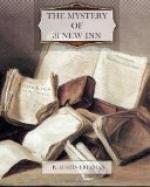“A man of science, Mr. Blackmore,” he said, “expects nothing. He collects facts and keeps an open mind. As to me, I am a mere legal Autolycus, a snapper-up of unconsidered trifles of evidence. When I have accumulated a few facts, I arrange them, compare them and think about them. Sometimes the comparison yields new matter and sometimes it doesn’t; but in any case, believe me, it is a capital error to decide beforehand what data are to be sought for.”
“Yes, I suppose that is so,” said Stephen; “though, to me, it almost looks as if Mr. Marchmont was right; that there is nothing to investigate.”
“You should have thought of that before you consulted me,” laughed Thorndyke. “As it is, I am engaged to look into the case and I shall do so; and, as I have said, I shall keep an open mind until I have all the facts in my possession.”
He glanced round the sitting-room, which we had now entered, and continued:
“These are fine, dignified old rooms. It seems a sin to have covered up all this oak panelling and that carved cornice and mantel with paint. Think what it must have been like when the beautiful figured wood was exposed.”
“It would be very dark,” Stephen observed.
“Yes,” Thorndyke agreed, “and I suppose we care more for light and less for beauty than our ancestors did. But now, tell me; looking round these rooms, do they convey to you a similar impression to that which the old rooms did? Have they the same general character?”
“Not quite, I think. Of course the rooms in Jermyn Street were in a different kind of house, but beyond that, I seem to feel a certain difference; which is rather odd, seeing that the furniture is the same. But the old rooms were more cosy, more homelike. I find something rather bare and cheerless, I was almost going to say squalid, in the look of these chambers.”
“That is rather what I should have expected,” said Thorndyke. “The opium habit alters a man’s character profoundly; and, somehow, apart from the mere furnishing, a room reflects in some subtle way, but very distinctly, the personality of its occupant, especially when that occupant lives a solitary life. Do you see any evidences of the activities that used to occupy your uncle?”
“Not very much,” replied Stephen. “But the place may not be quite as he left it. I found one or two of his books on the table and put them back in the shelves, but I found no manuscript or notes such as he used to make. I noticed, too, that his ink-slab which he used to keep so scrupulously clean is covered with dry smears and that the stick of ink is all cracked at the end, as if he had not used it for months. It seems to point to a great change in his habits.”
“What used he to do with Chinese ink?” Thorndyke asked.
“He corresponded with some of his native friends in Japan, and he used to write in the Japanese character even if they understood English. That was what he chiefly used the Chinese ink for. But he also used to copy the inscriptions from these things.” Here Stephen lifted from the mantelpiece what looked like a fossil Bath bun, but was actually a clay tablet covered with minute indented writing.




